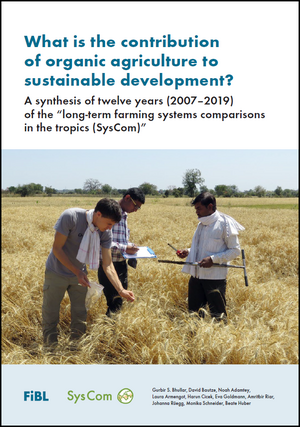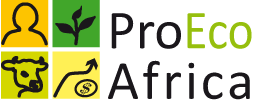Unique results of 12 years’ comparative on-station and on-farm research in Kenya, Ghana, Uganda, Bolivia, and India were presented, highlighting productivity, profitability, and sustainability benefits and trade-offs that organic systems and other agroecological approaches offer to society and the environment. The discussion reflected on policy recommendations towards selected SDG’s with a particular focus on smallholders.
- Dr. Irene Kadzere (FiBL) - Benefits and drawbacks of organic agriculture for African small-holder farmers
- Dr. Laura Armengot (FiBL) - Productivity and profitability of organic compared to conventional farming in Latin America and India
- Joseph Bandana (University of Ghana) - Is organic cocoa farming in Africa sustainable? Insight from comparative research
- Dr. Anne Muriuki (KALRO) - Mainstreaming organic at the national level through participatory research: Examples from ProEco and SysCom projects in Kenya
- Dr. David Amudavi (Biovision Africa Trust) - Reflections on the research findings and knowledge management from EOAI perspective: policy implications and recommendations
- David Bautze (FiBL)
Resource:
Productivity, Profitability and Sustainability of Organic and Conventional Faming Systems in Sub-Saharan Africa: Comparative analyses (2013 – 2019)- The project "ProEcoAfrica" (2013 – 2017) generated comparative scientific evidence on the productivity and profitability of conventional and organic production systems in Ghana and Kenya with an emphasis on the gender dimension to farming.
- Since March 2016, the project "Organic Food Systems Africa (OFSA) (2016 – 2019)" which complements and builds onto ProEcoAfrica is being implemented to generate comparative scientific evidence on the sustainability of these production systems in Ghana, Kenya and Uganda.
- www.proecoafrica.net
Resource:
RIOA (2021)  What is the contribution of organic agriculture to sustainable development? A synthesis of twelve years (2007-2019) of the “long-term farming systems comparisons in the tropics (SysCom)”. Research Institute of Organic Agriculture, Frick, Switzerland, 40 pages
What is the contribution of organic agriculture to sustainable development? A synthesis of twelve years (2007-2019) of the “long-term farming systems comparisons in the tropics (SysCom)”. Research Institute of Organic Agriculture, Frick, Switzerland, 40 pages
 What is the contribution of organic agriculture to sustainable development? A synthesis of twelve years (2007-2019) of the “long-term farming systems comparisons in the tropics (SysCom)”. Research Institute of Organic Agriculture, Frick, Switzerland, 40 pages
What is the contribution of organic agriculture to sustainable development? A synthesis of twelve years (2007-2019) of the “long-term farming systems comparisons in the tropics (SysCom)”. Research Institute of Organic Agriculture, Frick, Switzerland, 40 pagesThe results of 12 years of comparative farming systems research in Kenya, Bolivia, and India provide scientific evidence on economic and ecological sustainability of organic and conventional systems. They illustrate how organic systems and other agroecological approaches can contribute to the SDGs by 2030.
Related:
27 January 2021. Webinar Organic Agriculture - A realistic pathway? organized by FiBL and INTPA
27 May 2021. Open FiBL Day
This first digital Open FiBL Day showed how organic farming can contribute to climate change mitigation, what chickens have to do with organic apple growing in the future, if control with water markers really works or what FiBL’s contribution to sustainable cocoa production looks like.
This first digital Open FiBL Day showed how organic farming can contribute to climate change mitigation, what chickens have to do with organic apple growing in the future, if control with water markers really works or what FiBL’s contribution to sustainable cocoa production looks like.


No comments:
Post a Comment